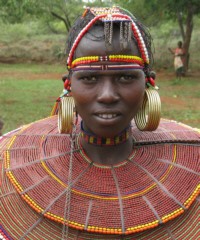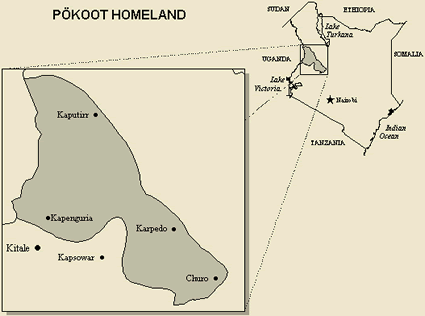The Pokot were once considered part of the Kalenjin people, who were highland Nilotic people who originated in southern Ethiopia and migrated southward into Kenya as early as 2,000 years ago. Though the Pokot consider themselves to be one people, they are basically divided into two sub-groups based on livelihood. About half of the Pokot are semi-nomadic, semi-pastoralists who live in the lowlands west and north of Kapenguria and throughout Kacheliba Division and Nginyang Division, Baringo District. These people herd cattle, sheep, and goats and live off the products of their stock. The other half of the Pokot are agriculturalists who live in conditions that allow farming.
The homestead is the social center for the Pokot. Here, a man lives with his wives, each having their own hut. All members of the family live here and the stock is corralled here at night. The man of the family rules the homestead, telling the others what duties they are to perform.
The position of women in Pokot society is weak. A woman has no voice in any public forums and no authority within her own homestead. She is considered "foolish", like the cows for which she is traded.
Illness and death are greatly feared among the Pokot. Death is the end of life, and there is no afterlife. Therefore, life is most important and is precious to the Pokot. Much of their religious ritual is involved in warding off illness or in effecting cures.
Most Pokot Kalenjins still follow their traditional religion. Some of them are Christians, but the majority are traditionalists. Even among the Christians, the traditional religious worldview is still dominant.
The Pokot Kalenjins need to be delivered from fear. They need to depend entirely on Jesus Christ for their protection.
Pray for Pokot Kalenjin Christians to put all their faith in Jesus Christ and lean on him for all their needs.
Pray that soon Pokot Kalenjin disciples will be discipling many throughout East Africa.
Pray for the Lord to provide for their spiritual and material needs as a testimony of his goodness and power.
Pray for a Holy Spirit-sent revival to move in Pokot Kalenjin churches.
Scripture Prayers for the Kalenjin, Pokot in Uganda.
Anonymous
| Profile Source: Joshua Project |












